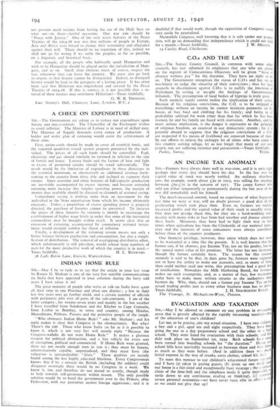A CHECK ON EXPENDITURE
SIR,—The Government are asking us to reduce our expenditure upon luxury and non-essentials. The Chancellor of the Exchequer wishes to avoid inflation. The Minister of Labour is in need of skilled men. The Minister of Supply demands every ounce of production. A bolder and wider plan of rationing would assist the achievement of these aims.
First, ration-cards should be made to cover all essential foods, and the required quantities issued against coupons presented by the indi- vidual. The prices of all such foods should be controlled. Fuel, electricity and gas should similarly be rationed in relation to the size of family and house. Luxury foods and the factors of heat and light in excess of permitted rations should be taxed substantially. The result would be the limitation of expenditure in these directions to the essential minimum, or alternatively an additional revenue forth- coming to the country from those able and inclined to augment their rations. Since overtime and other features of full-capacity production are inevitably accompanied by excess income, and because extended rationing must increase this surplus spending power, the margin of money thus available should be directed to channels of national saving.
Compulsory saving is nothing more than an investment by the individual in the State organisation from which his income ultimately emanates. Unless a proportion of excess spending power is properly directed, the purchase of luxuries cannot be prevented. To increase the prices of these luxuries by taxation is merely to encourage the establishment of higher wage levels in order that some of the inessential commodities may be brought within reach. It seems clear that an extension of rationing, accompanied by compulsory national invest- ment, would strongly combat the threat of inflation.
Finally, a development of the rationing system means not only a better balance between production and consumption, but also a simpli- fication of distribution. The removal of overlapping distributive effort, which unfortunately is still prevalent, would release large numbers of men for the more productive work of which the country is in need.—
Yours faithfully, H. L. KENWARD. 36 Lady Byron Lane, Knowle, Warwickshire.






























 Previous page
Previous page